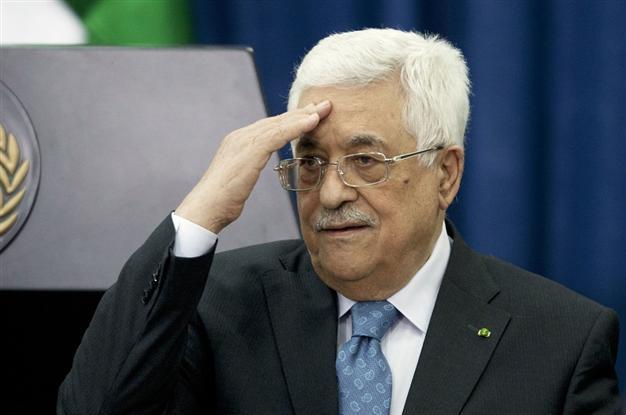Palestinians will never recognize Israel as ’Jewish state’: Abbas
RAMALLAH - AFP

Palestinian President Mahmoud Abbas gestures during a meeting with Jordanian Prime Minister Abdullah Ensour, in the West Bank city of Ramallah, Wednesday, April 23, 2014. AP Photo/Majdi Mohammed
Palestinians will never recognize Israel as the "Jewish state," president Mahmud Abbas said April 26, as his leadership convened to chart a course of action after Israel halted peace talks.
"In 1993 we recognized Israel," Abbas told members of the Palestine Liberation Organisation’s Central Council, adding that the Palestinians should not be forced to go a step further and recognize Israel’s religious identity.
Abbas also said the new unity government he is set to head with Hamas backing would reject violence and recognize Israel and existing agreements with it.
"The upcoming government will obey my policy," he told members of the Palestine Liberation Organisation’s Central Council. "I recognize Israel and reject violence and terrorism, and recognize international commitments."
"The speech had mostly positive points, and we cannot but support it on topics such as Jerusalem, reconciliation and not recognizing (Israel as) the Jewish state, in addition to the failure of (peace) negotiations," Bassem Naim, an adviser to Hamas’ Gaza Strip prime minister Ismail Haniya, told AFP.
Israel had made recognition of it as a "Jewish state" a key demand in peace talks, which it withdrew from after Abbas’s PLO on April 23 signed a reconciliation deal with the Islamist Hamas movement, which does not recognize Israel’s right to exist.
Any new measures would follow a raft of financial sanctions unveiled this month when the Palestinians applied to adhere to 15 international treaties.
"The pact with Hamas kills peace," Netanyahu told NBC television shortly after the cabinet decision. Netanyahu said it was signed "while Israel was making efforts to advance the negotiations with the Palestinians" and was "a direct continuation of the Palestinian recalcitrance to promote negotiations," due to expire on April 29.
Israel's chief negotiator, Justice Minister Tzipi Livni, said they had proposed a "creative solution" on April 22 that would enable extending talks. She said Israel was only "suspending" talks and "the door has not been shut today," stressing the sanctions planned were "measured" and "would not collapse the Palestinian Authority."
But senior Palestinian official Saeb Erakat told AFP "Netanyahu's government has been asked for years to choose between peace and settlements, and it chose settlements." He said the Palestinian leadership would "look into all options to respond" to Israel's decisions.
Arab League chief Nabil al-Arabi said in a statement the group "fully supports Palestinian president Abbas in facing all the pressures applied on him by Israel."
U.S. envoy Martin Indyk has repeatedly met both sides to try to salvage the negotiations, and met with Abbas in Ramallah on April 24.
U.S. Secretary of State John Kerry insisted peace talks could still advance if the sides compromised. "There's always a way forward, but the leaders have to make the compromises to do that. We may see a way forward, but if they're not willing to make the compromises necessary it becomes very elusive," he said.
